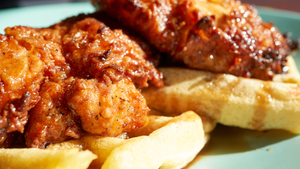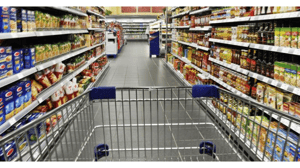PARTNERSHIP CALLED RICH RECIPE
CHICAGO -- As today's supermarkets come more and more to resemble miniature shopping malls, some operators are rediscovering a partnership formula that has proven to be both popular and profitable.In some cases, retailers are working out individual deals with independent bakers; others are going the franchise route, either bringing in a brand name themselves or leasing out square footage to a third-party
October 12, 1998
CAROL KROSKEY
CHICAGO -- As today's supermarkets come more and more to resemble miniature shopping malls, some operators are rediscovering a partnership formula that has proven to be both popular and profitable.
In some cases, retailers are working out individual deals with independent bakers; others are going the franchise route, either bringing in a brand name themselves or leasing out square footage to a third-party franchisee. Either way, operators contacted by SN say the arrangements relieve them of some responsibility in the increasingly complex store environment, which today might include banking, video rentals, floral departments, specialty coffee shops, on-premise dining and dry cleaning.
In most cases, the supermarket benefits from having the aroma, activity, color and presentation of an in-store bakery without the operational headaches that often accompany the department. By leasing space to an independent operator, supermarkets can not only maintain a competitive position, but also show a positive return on the floor space, depending on the terms of the lease agreement.
Conversely, the independent baker benefits from a location that is at least a weekly destination for consumers.
Although many studies of consumer buying habits have shown that, on average, only 20% to 25% of supermarket shoppers buy products from the in-store bakery, that customer base is often higher than what many freestanding bakery locations can draw consistently.
The partnership between McGlynn's Bakery Inc., Fridley, Minn., and a variety of supermarkets in the Minneapolis/St. Paul area, as well as the Milwaukee area, demonstrates the potential longevity of such an arrangement. Target stores in the Twin Cities area have hosted McGlynn's Bakery units since 1962, when Burt McGlynn began baking on the premises in two units. Over time, McGlynn's built central production plants, which now service more than 18 stores in the Milwaukee area -- most of them Pick 'N Save stores -- and more than 230 additional food stores in the Twin Cities, including Rainbow Foods, Festival Foods, Jubilee Foods, Target and Daytons, as well as McGlynn's Bakery outlet stores.
Typically, the in-store locations include several dry and refrigerated service cases to allow more fragile products to be merchandised properly. In-store cake decorators also work in many of the McGlynn's supermarket bakery units to make up custom cakes for customers who didn't order in advance. Because the bakery personnel work for McGlynn's, the supermarket managers in stores that host these bakeries have no hiring, staffing or scheduling decisions to worry about in the bakery.
Still, some supermarket operators prefer to have a high level of in-store baking. Following the path established long before by independent retail bakers, franchise bakers have become yet another option for retailers looking to lease out bakery operations.
For example, the Manhattan Bagel Co. recently announced that it plans to open a Manhattan Bagel outlet in the Weis Markets superstore expected to open in Lancaster, Pa., this fall. The bagel unit will be operated by Lancaster-based Bird-in-Hand Corp., whose principal, John Smucker, operates a Manhattan Bagel freestanding franchise in the area. This is the first Manhattan Bagel unit in the Sunbury, Pa.-based Weis Markets chain. Weis operates 155 stores in six states.
Meanwhile, Manhattan Bagel units number more than 310, located in 18 states and Washington. So, while the potential for many more units draws franchisors such as Manhattan Bagel, retailers such as Weis can piggyback onto a franchisor's established name recognition, promotions and advertising.
Employees will boil and bake bagels throughout the day at the Weis location, yielding the aroma and theater that initially drew supermarket operators to in-store bakeries. Already, Weis Markets and Manhattan Bagel are exploring the possibility of additional sites in Pennsylvania and Maryland, according to Rocco Fiorentino, vice president of business development for Eatontown-N.J.-based Manhattan Bagel.
However, this isn't Manhattan Bagels' initial foray into supermarkets. Some of the company's franchisees and licensees already operate units in other supermarkets, including Foodtown, D&W Food Centers and Clemens Markets. Of the Weis opening, Fiorentino said, "This store opening will represent another milestone in our partnership with the supermarket industry."
Other franchisees are cautiously dipping a toe into the supermarket pool. Milwaukee-based Breadsmith currently lists two locations within Wild Oats Community Markets in Buffalo Grove, Ill., and Scottsdale, Ariz. Because the from-scratch, sourdough-type breads in which Breadsmith specializes are more labor-intensive, they can be difficult to incorporate into supermarket production schedules.
About the Author
You May Also Like




